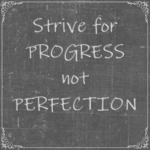 What if you could reduce your risk of developing Alzheimer’s disease by up to 53%?
What if you could reduce your risk of developing Alzheimer’s disease by up to 53%?
And, wouldn’t we all like to slow down “old age forgetfulness” and improve our memory?
We have great news…recent research says you can!
Perhaps you have heard of the Dietary Approaches to Stop Hypertension (DASH) diet for high blood pressure or the Mediterranean diet for heart health? When it comes to protecting your brain, scientists have determined that a hybrid of these two eating styles may be best.
“MIND”ful eating!
 Dubbed the “MIND” diet, short for Mediterranean-DASH Intervention for Neurodegenerative Delay, this eating pattern goes big on natural, unprocessed (otherwise known as…REAL) plant-based foods while keeping a lid on red meat, saturated fat and sweets.
Dubbed the “MIND” diet, short for Mediterranean-DASH Intervention for Neurodegenerative Delay, this eating pattern goes big on natural, unprocessed (otherwise known as…REAL) plant-based foods while keeping a lid on red meat, saturated fat and sweets.
Researchers tracked detailed eating logs in an older adult population for an average of 4.5 years to uncover diet trends among those who developed dementia versus those who didn’t. Their discovery: older adults whose diets most closely resembled the pattern laid out in the MIND diet (which, remember, is REAL food) had brains as sharp as people 7.5 years younger, equating to cutting the cost and prevalence of Alzheimer’s in half!
How does your diet stack up?
Give yourself a point (or check mark) for each of the following MIND diet rules you typically follow (up to a max of 15 points.)
√  Large portioned green leafy vegetables (such as salad) at least six times a week
Large portioned green leafy vegetables (such as salad) at least six times a week
√ Other vegetables at least once a day
√ Berries at least twice a week
√ At least 3 whole-grain servings per day
√ Red meat less than four times a week
√ Fish at least once a week
√ Poultry at least twice a week
√ Beans more than three times a week
√  Nuts daily (or at least five times a week)
Nuts daily (or at least five times a week)
√ Fried or fast food less than once a week (if at all)
√ Mainly olive oil for cooking
√ Less than a tablespoon of butter a day
√ Less than a serving of cheese a week
√ Less than five pastries or sweets a week (or less!)
√ One glass of wine or other alcoholic drink a day
So how many YES’s did you get? And more importantly, how many more could you get if you tried?
Don’t worry, you don’t have to be perfect to reap the benefits!
 Those in the study who had an average score of 9.6 points out of 15 saw the biggest drop in their Alzheimer’s risk, while the ones who scored in the middle (7.5 points) still cut their risk by over one third!
Those in the study who had an average score of 9.6 points out of 15 saw the biggest drop in their Alzheimer’s risk, while the ones who scored in the middle (7.5 points) still cut their risk by over one third!
Furthermore (not to brag), but everything the MIND diet teaches, is EXACTLY what Eat REAL America and our Eat REAL Cookbook – 28 Day Kickstart show you how to do, AND OH SO DELICIOUSLY! Plus, we also add in all the cancer fighting (cruciferous) foods too!
And, there’s more!
While the MIND diet is certainly good, there are many experts that advise we can do even better with these tips:
- Seriously limit added sugars and refined grains. Studies are strongly pointing to Alzheimer’s being “type 3 diabetes.” So saying “no thank you” to sugary beverages, cakes, cookies, white bread and desserts goes a long way to help your brain.
- Add mushrooms twice a week! According to the March 2019 Journal of Alzheimer’s Disease, studies show eating 3/4 cup cooked mushrooms (and yes, preferably cooked instead of raw) twice weekly reduces the risk of cognitive decline by 50%. Their secret powers lie within their ergothioneine (ET for short), which is a unique antioxidant and anti-inflammatory we are unable to produce on our own. And mushrooms have also been found to be a powerful cancer fighter too, so go ahead and add mushrooms to everything (grind them up and mix with ground meat, which is perfect for family members that THINK “they don’t like mushrooms”)!
 Enjoy coffee and green tea! Both the caffeine and their incredibly high anti-oxidants may be the reasons for studies finding cognitive benefits with both coffee and green tea. Studies have also found specific benefits in overall memory, spatial memory, and working memory.
Enjoy coffee and green tea! Both the caffeine and their incredibly high anti-oxidants may be the reasons for studies finding cognitive benefits with both coffee and green tea. Studies have also found specific benefits in overall memory, spatial memory, and working memory.- Pump up the spices! Turmeric, ginger and cinnamon (preferably ceylon cinnamon) are notable in their high anti-oxidant nutrients and anti-inflammatory properties. Add them to smoothies, oatmeal, curries and even coffee! Try a few of these great-tasting ideas: Moroccan Vegetable Curry, Curry Roasted Cauliflower and Carrots, Turmeric Latte, and Indian Spice Burger with Mango Salsa.
 Enjoy 60% or higher dark chocolate! Multiple studies have associated cocoa with a lower chance of cognitive decline. Cocoa powder (100% cocoa) can be added to oatmeal (such as Neapolitan Overnight Oats), yogurt (try our Berry and Raw Brownie Parfait) and energy bites (the Chocolate Chia Energy Bites are delicious!), so you can get the benefits without the added sugar, fat and calories.
Enjoy 60% or higher dark chocolate! Multiple studies have associated cocoa with a lower chance of cognitive decline. Cocoa powder (100% cocoa) can be added to oatmeal (such as Neapolitan Overnight Oats), yogurt (try our Berry and Raw Brownie Parfait) and energy bites (the Chocolate Chia Energy Bites are delicious!), so you can get the benefits without the added sugar, fat and calories.- Measure and supplement vitamin D and vitamin B12. Being deficient in vitamin B12 can create similar symptoms as Alzheimer’s. Supplementing and raising your blood level can reverse those symptoms. Vitamin D is also a critical nutrient linked to Alzheimer’s, as well as many conditions including diabetes, cancer, and heart disease. Most experts recommend supplementing 1,000 to 2,000 IU Vitamin D3 every day.
There are also other important lifestyle factors to fight Alzheimer’s:
- Don’t smoke.
- Get good quality sleep. This means 7 to 8 hours per night. (If you have sleep apnea, it’s a must to diagnose and treat it.)
 Exercise. According to the Alzheimer’s Research and Prevention foundation, regular physical exercise can reduce your risk of Alzheimer’s disease BY UP TO 50%! Aim for at least 150 minutes (or about 20 minutes per day) of moderate intensity exercise each week, adding time for weightlifting (or resistance training). Remember, finding what you enjoy is key! Top-rated exercises for the brain include dancing, biking, walking briskly/running and lifting weights, as well as yoga.
Exercise. According to the Alzheimer’s Research and Prevention foundation, regular physical exercise can reduce your risk of Alzheimer’s disease BY UP TO 50%! Aim for at least 150 minutes (or about 20 minutes per day) of moderate intensity exercise each week, adding time for weightlifting (or resistance training). Remember, finding what you enjoy is key! Top-rated exercises for the brain include dancing, biking, walking briskly/running and lifting weights, as well as yoga.- Stay socially engaged. Human beings are highly social creatures. We don’t thrive in isolation, and neither do our brains!
- Stimulate your brain. Those who continue learning new things and challenging their brains throughout life are less likely to develop Alzheimer’s and dementia. Practice memorization, musical instruments, enjoy strategy games, puzzles and even try writing or eating with your non-dominant hand!
- Manage your stress. Chronic stress can take a heavy toll on the brain, leading to shrinkage in a key memory area, and hampering nerve cell growth. Yet simple stress management practices (including eating the right foods) can minimize its harmful effects. Take deep breaths, schedule daily relaxation activities, laugh and remember to have fun!
Please tell us!
From what we presented here, what TWO things are you already doing well, and what TWO things will you start working on right away? Let’s set some goals and so we will all still be here learning about, cooking and enjoying REAL Food…well into our golden years!
References
https://www.ncbi.nlm.nih.gov/pmc/articles/PMC4532650/
https://www.medicalnewstoday.com/articles/291073.php
https://www.helpguide.org/articles/alzheimers-dementia-aging/preventing-alzheimers-disease.htm/
 LEARN MORE ABOUT THE NAPKIN!
LEARN MORE ABOUT THE NAPKIN!




In Lifestyle I have 1 and 2 down. Have been treated for sleep Apnea since 2007. I’m working on improving my eating with the help of the Eat Real cook book and this website. I joined the AARP walking challenge but have not been doing well at getting the 30 mins a day in. To be honest most of the time I have logged has been on the days I’ve cut the grass. There are so many things I need to be doing from these lists.
Thanks for sharing Susan. You are doing better than most! I am grateful for this list…we can print and post it to remind us to keep working on these things. As for being consistent with walking, I suggest getting a walking buddy or walking while listening to a book or music, or on a treadmill while watching a movie. All makes it fun to look forward to walking, which will go a long way towards laying down a habit. And of course, the resistance exercise too! Keep up the great work and good luck!
Ugggh! You all got me this week. Yes I scored about a 9 off the list. Eating right are not the issues. Exercise I don’t participate in, but I do walk to work everyday and log in a min. of 10,000 steps a day. I do not fair to well in the Stress department or the sleep category. Last week I put in over 90hrs. and the stressful job is not going away. But I also believe it’s how you deal w/ the stress and I handle it well. And let’s face it if you’re working these kind of hours you don’t get much sleep. So I have a lot to work on!! Thank you both for always reminding me that I need to do better in a lot of ways. Has anyone tried Turmeric in their coffee? Interesting.
Chef Paul – We really appreciate your feedback! You are such a hard worker and so incredibly talented at what you do, I can imagine getting enough (or even close to enough) sleep is extremely challenging! Just so you know, the amazing way you handle stress is an inspiration for us! Thank you for everything you do!
I am good on the berries – coffee- olive oil – I am going to get the mushrooms in weekly and start reading more non- fiction books. I would like to learn French I will check into adult ed classes here. Thanks!!